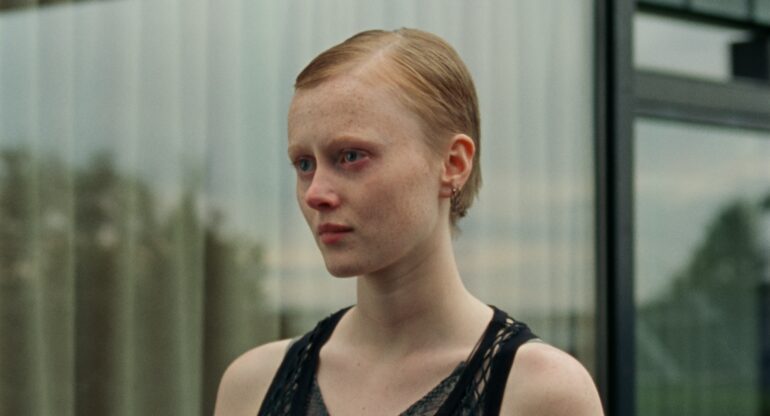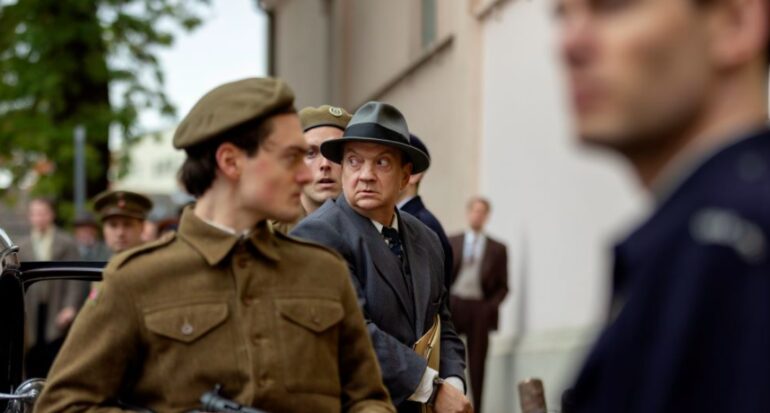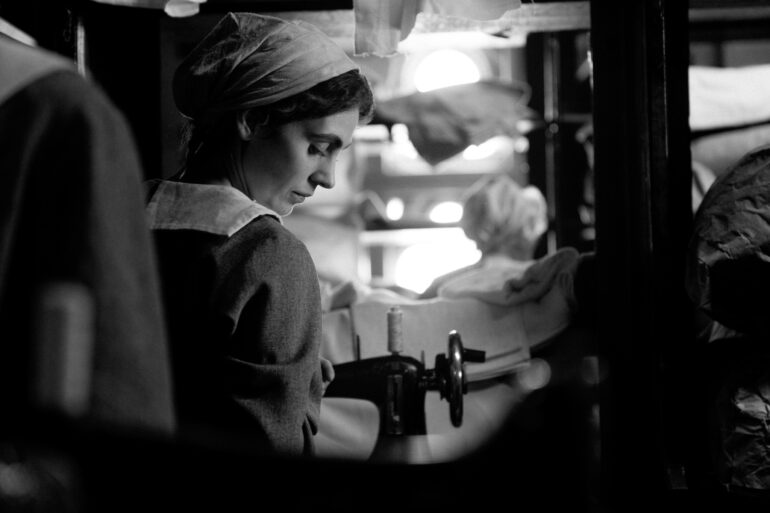Written by: Geoffrey Macnab
29.02.24
A look at some of the Nordic films to tempt festival programmers in Cannes, Venice, Toronto and beyond. It is shaping up to be a strong year for Nordic cinema on the Croisette and the Lido.
There were only a handful of majority Nordic productions in the official selection at the 2024 Berlinale, but Nordic films are expected to be centre stage at festivals later this year, including Cannes, Venice and Toronto.
“Previously, there were many more Nordic titles in Berlin, but that seems to have changed,” one leading sales agent commented of the relative lack of Nordic fare at the Berlinale under its current leadership. It remains to be seen whether this will change with the arrival of incoming festival director Tricia Tuttle, the ex-BFI London Film Festival boss, who will be in charge by the next edition.
Nonetheless, some Nordic films did make a splash in Berlin last week. Dag Johan Haugerud’s provocative Norwegian drama Sex, the first feature in his Sex Dreams Love (Sex Drømmer Kjærlighet) trilogy about sexual freedom, won three awards after its premiere in the Berlinale Panorama, and has been sold to multiple territories by m-appeal.
Gustav Möller’s prison drama Sons (Vogter), starring Sidse Babett Knudsen, received strong reviews after its premiere in the Berlin competition.
Other Nordic titles and co-productions featured in the official selection. The much admired Iranian competition entry My Favourite Cake (Keyke mahboobe man), which won two awards, including a FIPRESCI Prize, had a Swedish writer-director in Maryam Moghaddam (working alongside Behtash Sanaeeha); a Swedish producer, Peter Krupenin from HOBAB, and significant Swedish financing. Meanwhile, No Other Land (Norwegian Antipode Films) won best documentary and audience prize in Panorama. There were also over 30 Nordic films represented in the European Film Market in Berlin. But many Nordic industry delegates in Berlin last week were already looking ahead to forthcoming festivals at which Nordic work is expected to be far more prominent. After all, in the course of the last three years, Cannes alone has given premieres to such global Nordic hits as Fallen Leaves (Kuolleet lehdet), Triangle of Sadness, and The Worst Person in the World (Verdens verste menneske).
Plenty of new Nordic titles are vying to emulate these successes. From Iceland, Rúnar Rúnarsson's new feature, When The Light Breaks (Ljósbrot), sold internationally by Party Film Sales, will be ready for festivals in the spring and summer. Produced by Rúnarsson and Heather Millard, this is an emotional drama about a young art student dealing with sudden loss. The director’s earlier films like Volcano (Eldfjall) and Sparrows (Þrestir) have been screened in Cannes and San Sebastián.
Touch (Snerting), the latest feature from Icelandic master Baltasar Kormákur, could also land at a major festival. This is about a man who, after the start of the pandemic, sets out to discover what happened to his Japanese girlfriend after she mysteriously vanished from London 50 years earlier. The film, shot on location in Iceland, Japan and the UK, will be released in the US by Focus Features in the summer.
Pirjo Honkasalo is one of Finland’s most renowned documentary makers, but she also directs dramatic films, and her emotional thriller Orenda, following two women on a remote island, is close to completion. It is produced by Bufo, and sales are handled by The Yellow Affair. There was considerable buzz around the project after it was presented in Works in Progress in Göteborg. Alma Pöysti (who played the lead in Fallen Leaves) headlines the cast alongside Pirkko Saisio.
Another Finnish film likely to be vying for festival selection is Parvet (working title), the new film from Aamu Film Company (the outfit behind the the Cannes Grand Prix winner 2021 Compartment No. 6 (Hytti nro 6) and the 2016 Cannes Un Certain Regard winner The Happiest Day in the Life of Olli Maki (Hymyilevä mies)) and A drama about the intersecting lives of 10 young adults, it is directed by Hannaleena Hauru (whose earlier feature Fucking With Nobody premiered in Venice as part of the Biennale College Cinema in 2020) and Katja Gauriloff.
Klaus Härö’s historical drama Never Alone (Ei koskaan yksin), set during the alliance between Finland and Nazi Germany against the Soviets during 1942, may also catch festival programmers’ attentions. Sales are handled by The Playmaker Munich.
Meanwhile, the Norwegians are bullish about their festival prospects for the rest of 2024.
Erik Poppe’s Quisling (Quislings siste dager), a historical drama about the notorious Norwegian politician who collaborated with the Nazis, could be strong festival bait. Produced by Paradox, it is sold by Rikke Ennis’s ReInvent Studios.
The article continues after the picture.
The other two films in Haugerud’s Sex trilogy (supported by the Nordisk Film & TV Fond and produced by Motlys) will also surface later this year, Dreams (Drømmer), about a young woman exploring her sexuality, could potentially premiere at a festival in the early summer, whereas Love (Kjærlighet), about a middle aged woman bored of monogamy, is a possibility for autumn festivals. (That’s a similar roll-out to the one famously achieved by Polish master Krzysztof Kieslowski with his Three Colours trilogy 30 years ago).
Norwegian director Halfdan Ullmann Tøndel’s Armand, about a six year old kid accused of crossing boundaries against his best friend at school, is also being strongly tipped for festival selection. The director is the grandson of Nordic filmmaking royalty Liv Ullmann and Ingmar Bergman.
There should also be interest in Loveable (Elskling), Lilja Ingolfsdottir’s debut feature. Sold by TrustNordisk and produced by Thomas Robsahm (The Worst Person In The World), this divorce drama was a prize winner at the Finnish Film Affair. It is expected be ready by the autumn.
Norwegian-Kurdish director Brwa Vahabpour’s comedy drama Europa, produced by True Content Production, was well received in Göteborg’s Works in Progress section, and may also be on the radar of festival programmers.
Denmark has several films tipped to land at major festivals in the coming months.
Magnus von Horn’s The Girl With The Needle (Pigen med nålen) (a dark drama about a pregnant factory worker set in post-World War I Copenhagen, and sold by The Match Factory) and Joshua Oppenheimer’s apocalyptic musical The End (starring Tilda Swinton and also sold by The Match Factory) are obvious A-list festival candidates.
The article continues after the picture.
Mads Hedegaard’s Stranger (Fremmed), a survival drama set 4000 years BC and sold by Reinvent Studios, might well spark curiosity from the major festivals.
Christian Bonke’s psychological drama Hercules Falling starring Dar Salim could also surface later in the year. Sales are handled by Reinvent Studios.
Meanwhile, Frederik Louis Hviid’s action drama The Quiet Ones, sold by TrustNordisk, and about the largest ever robbery on Danish soil, could be a festival contender later in the summer (the director’s earlier film Enforcement (Shorta) was in Critics’ Week in Venice in 2020).
Sweden should also be well represented in Cannes, Venice and TIFF.
John Skoog’s Redoubt (Värn), produced by Triangle Of Sadness’s Erik Hemmendorff at Platform Produktion and starring France’s Denis Lavant as a farmer caught on the tide of history, looks just the type of film to tempt A-list programmers.
In an Olympic year, there might be extra festival interest in Frida Kempff’s The Swedish Torpedo (Den svenska torpeden), about an intrepid woman’s attempt to swim the English Channel. Recently presented in Works in Progress at Göteborg, and starring Josefin Neldén, this film is produced by Erik Andersson at Läsk and David Herdies at Momento Film. Director Kempff has strong festival pedigree, having premiered her psychological horror picture Knocking (Knackningar) at Sundance in 2021, and winning a prize in Cannes in 2010 for her short Bathing Micky (Micky Bader).
Sarah Gyllenstierna’s debut feature Hunters On A White Field (Jakt), a hunting drama sold by Level K, has its local release scheduled through TriArt in the spring, but could still make the cut for a major festival.
Swedish (but Norwegian-based) Fanny Ovesen’s new feature Laura was recently presented in Göteborg’s Works in Progress. A road movie that deals with female friendship and issues around consent, this was filmed in seven countries, and has support from Film i Väst and Eurimages, among others.


